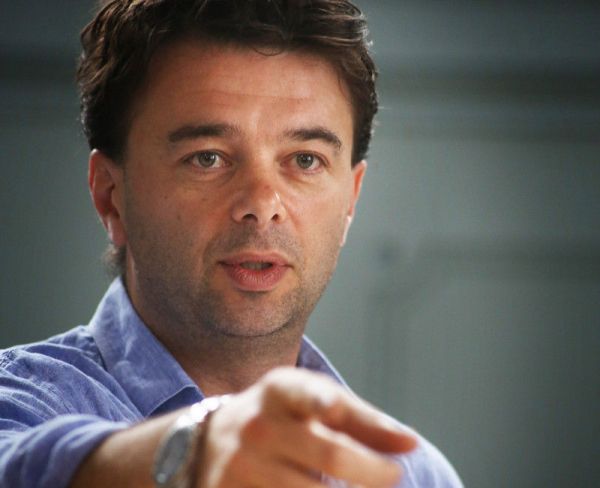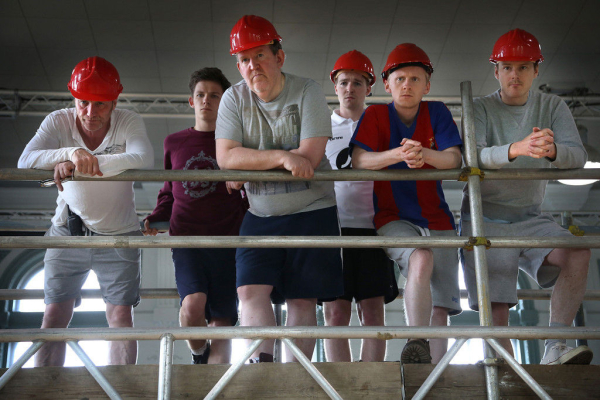Edward Hall on marking the Miners' Strike and the secret of his Hampstead success
In his fifth year as artistic director at Hampstead Theatre, Edward Hall is marking the 30th anniversary of an event that irrevocably changed modern Britain

"I'm always looking for plays that have a contemporary resonance," explains Edward Hall, who is directing Wonderland in his fifth year as artistic director – five years that have seen an unprecedented turnaround in fortunes for the once beleaguered venue (but more on that later).
"I read it and was struck by it. I was really forcibly struck by the ambition of the writing, the breadth of political research and knowledge and the extraordinary ear for dialogue."
Wonderland, which was plucked by Hall from the venue's unsolicited 'slush pile', is the second play by Beth Steel, the daughter of a miner.
It's billed as a "360 degree view" of the miners' strike, which saw Thatcher's government locked in a battle of ideology with the pit workers of Britain who, led by union head Arthur Scargill, embarked on a year-long picket in protest at mine closures.
"I love big plays," adds Hall, "and this is huge".
Thatcher and Scargill, the lynchpins of the strike in political terms, are nowhere to be seen. Rather, it's the miners and their families who take centre stage. Hall describes a trip down Thoresby mine, one of just two deep-pit coal mines still in action today, as "life changing".
"Ashley [Martin Davis, designer] and I wanted to get a feel for the world we were trying to create," explains Hall, who was shown around by the playwright's father, who has mined for 35 years. "The visuals down there are extraordinary, we were really knocked sideways, and that's what we've tried to recreate on stage at Hampstead."
To achieve this, the theatre is being reconfigured in the round, as it was for the 2012 production of Chariots of Fire. The company have rehearsed how to rig dynamite and how to work a coal cutter, among other things.
"The title is key; it really is a journey into a Wonderland."

Hall readily admits the theatrical world of his upbringing – I'm sure you don't need me to tell you he's the son of directing legend Peter Hall – was about as far removed from the mining communities as you can get, but he's clearly passionate about the subject. He speaks for ten unbroken minutes about the strike and has done a painstaking level of research – including taking his whole cast down a mine to see the reality for themselves.
He claims the play doesn't take sides, that it views the strike from an objective distance and puts Thatcher's arguments on a level playing field with the miners. I contend that this is difficult to believe, considering its authorship and his decision to focus so closely on the lives of the men underground.
"Whether you're a Thatcherite or a Scargillite is irrelevant," Hall insists. "Beth has documented what was an extremely complicated and fraught period – Thatcher was very close to putting out the army at one stage – but at the centre of it all is the miners."
It's an intriguing prospect, particularly when one considers that – Billy Elliot aside – there has been a notable shortage of plays concerning the miners' strike and its fall-out (as a North Easterner myself, I'm well aware of its continuing ramifications).
"I'm probably the last generation that remembers the three-day working week of the 70s," says Hall, who is 47. "It's important to remember where we were back then, and that Thatcher had a point."
I wonder if there's something incongruous about telling the story of the miners in a theatre in leafy Hampstead. "The location is irrelevant," Hall contends, "our audience is very culturally diverse and open to ideas. I'd say if anything it's a great place to do this play."
Would he like to take it to the mining communities? "I'd certainly tour it if I had a chance."
“The stabilising of the institution has come through the work that we’ve done on stage”
“The stabilising of the institution has come through the work that we’ve done on stage”
Talk of the Hampstead brings us to a discussion of his tenure as artistic director, during which he has brought the venue back from the brink of financial ruin to a situation in which its books currently boast a near half million pound surplus. He's overseen five major West End transfers (Ecstasy, Chariots, Judas Kiss, Belongings and the recent Good People) – one for every year he's been in charge.
How's he done it? "I think it's three things," he replies matter-of-factly. "Risk, luck and hard work."
Hall pays tribute to the team he has around him and the fact that he's turned it from a one to a two space venue by opening up the Hampstead Downstairs. And he says his audience has responded to the range of his programming – from plays by Athol Fugard and Howard Brenton to recent Kinks musical Sunny Afternoon, which is rumoured to be his sixth transfer.
"The stabilising of the institution has come through the work that we've done on stage," he summarises, which would seem to counteract the current school of thought that theatres can be successful without an artistic director at the helm.
The next phase is a major front of house redevelopment, aimed at persuading the audience to, in Hall's words, "spend their [pre-show] money under my roof" as opposed to one of the nearby eateries or wine bars.
At the rate Hall's going it will no doubt be an enormous success, and I look forward to sampling the all-in-one Hampstead Theatre evening soon.
With the Arts Council's next round of cuts announced next month, I'm curious to know if Hall is nervous. "I'm concerned, like everybody's concerned, because you don't get money if there isn't any funding – it doesn't matter how good your work is.
"That's the problem, the money is dwindling, so none of us should be apathetic. You don't lose your grant because you don't deserve it, you lose it because there isn't enough money, so in that sense it's a lottery."
But it would seem an awful injustice if the Arts Council, who showed such faith in Hall's abilities early on, should lose it now.
So how long's he sticking around?
"I'm not going anywhere until Hampstead is secure – I don't want to see any of our work thus far undone," says Hall with the kind of passion with which he's discussed the miners. "And also, I'm having far too much of a good time."
Wonderland runs at Hampstead from 20 June to 26 July 2014













